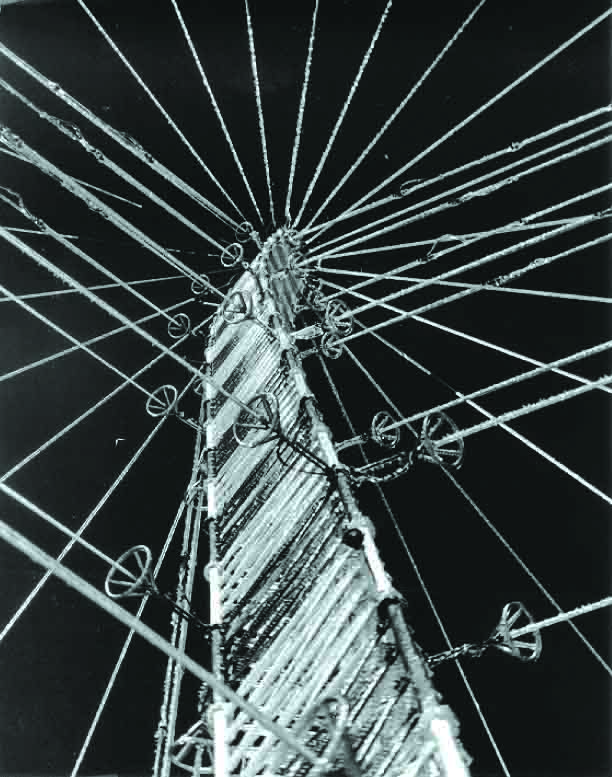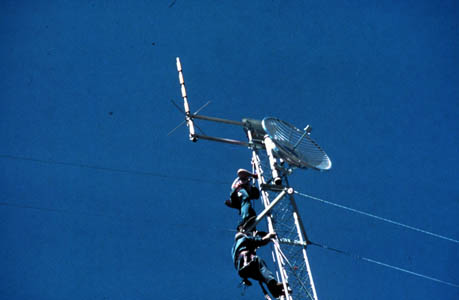 Loran on ice
Loran on ice(UPDATED January 7, January 12) The U.S. Coast Guard (USCG) posted a notice in the Federal Register on January 7 certifying that termination of the Loran-C signal will not adversely affect the safety of maritime navigation and that decommission will begin on February 8 with all Loran stations expected to cease transmitting the Loran-C signal by October 1, 2010.
Meanwhile, the Department of Homeland Security has certified that the Loran-C system infrastructure is not needed as a backup to the GPS system or to meet any other federal navigation requirement.
(UPDATED January 7, January 12) The U.S. Coast Guard (USCG) posted a notice in the Federal Register on January 7 certifying that termination of the Loran-C signal will not adversely affect the safety of maritime navigation and that decommission will begin on February 8 with all Loran stations expected to cease transmitting the Loran-C signal by October 1, 2010.
Meanwhile, the Department of Homeland Security has certified that the Loran-C system infrastructure is not needed as a backup to the GPS system or to meet any other federal navigation requirement.
Although the Federal Register notice also indicates that a decision has not been made on the need for a GPS backup, the announcement apparently brings to a close a seemingly interminable process of preserving and upgrading the terrestrial radionavigation system to provide an enhanced Loran (eLoran) capability that could serve as a multimodal backup to failures or interference to the Global Positioning System.
That process spanned several years, two administrations, and the expenditure of $160 million over the last 10 years to partially modernize a network of Loran stations that now will be phased out. It also flies in the face of an independent assessment team’s unanimous recommendation to establish eLoran as a GPS backup, as well as the efforts of navigation counterparts in other nations, notably the United Kingdom, to implement eLoran.
The action also elicited strong criticism from U.S. Senator Susan Collins, Maine, the highest-ranking Republican member of the Senate Homeland Security and Governmental Affairs Committee.
"The mistaken decision to terminate the Long Range Aide to Navigation (LORAN)-C navigational signal ignores the law, which requires the Secretary of Homeland Security to determine if this infrastructure is needed as a backup for the Global Positioning System (GPS) prior to termination," Collins said January 7.
“Given the vulnerabilities and limitations of GPS, LORAN should be maintained and enhanced to become a vital backup system to GPS for various critical infrastructure users," Collins said. "In terms of taxpayer investment, the best course of action clearly would be to keep and upgrade to eLORAN. In terms of commerce, national defense and security, following this course of action becomes even more apparent and indisputable."
And, in a January 12 House of Lords debate in the UK, John, Earl Attlee, the Conservative Party’s shadow minister for transport, martime and shipping, described his experience at a series of GPS jamming trials held off Tynemouth on Britain’s northeast coast.
"At one point, my own hand-held GPS suggested that I was in Romania . . . [It] does not seem to me that eLoran is a particularly expensive system in comparison with a space-based one, especially as there is already a legacy Loran structure in place with 72 percent of the world’s 50 busiest covered by Loran," he said.
According to the notice signed by Rear Admiral Kevin S. Cook, the USCG’s director of prevention policy, Loran-C is no longer required by the armed forces, the transportation sector, or the nation’s security interests, and is used only by a small segment of the population. According to the Federal Register statement, the Loran-C system was not established as, nor was it intended to be, a viable systemic backup for GPS.
Backups to GPS for safety-of-life navigation applications, or other critical applications can be other radionavigation systems, or operational procedures, or a combination of these systems and procedures, according to the administration’s assessment. Backups to GPS for timing applications can be a highly accurate crystal oscillator or atomic clock and a communications link to a timing source that is traceable to Coordinated Universal Time (UTC).
With respect to transportation — including aviation, commercial maritime, rail, and highway modes — the Department of Transportation has determined that sufficient alternative navigation aids currently exist in the event of a loss of GPS-based services, and therefore Loran currently is not needed as a back-up navigation aid for transportation safety-of-life users, the agencies have concluded.
According to the announcement, DHS “will continue to work with other Federal agencies to look across the critical infrastructure and key resource sectors identified in the National Infrastructure Protection Plan assessment to determine if a single, domestic system is needed as a GPS backup for critical infrastructure applications requiring precise time and frequency.
“If a single, domestic national system to back up GPS is identified as being necessary, the Department of Homeland Security will complete an analysis of potential backups to GPS. The continued active operation of Loran-C is not necessary to advance this evaluation.”
The USCG documents that will be published on January 7 can be found on-line: Record of Decision (ROD) on the U.S. Coast Guard Long Range Aids to Navigation (Loran-C) Program 2010-00084 [Docket No. USCG-2007-28460]
Terminate Long Range Aids to Navigation (Loran-C) Signal 2010-00083 [Docket No. USCG-2009-0299].
- SEE Glen Gibbons’ January-February 2010 Inside GNSS editorial on the consequences of Loran’s demise





